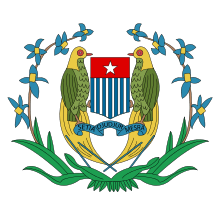Republic of West Papua
| Republic of West Papua | ||||||||||||||
| Republik Papua Barat | ||||||||||||||
| Unrecognized state | ||||||||||||||
| ||||||||||||||
| Motto "Loyal, Honest, Affectionate" | ||||||||||||||
| Anthem Hai Tanahku Papua Oh My Land Papua | ||||||||||||||
 Territory claimed by the Free Papua Movement. | ||||||||||||||
| Capital | Jayapura | |||||||||||||
| Government | Republic | |||||||||||||
| History | ||||||||||||||
| • | Established | 1962 | ||||||||||||
| • | End of Dutch rule | October 1, 1962 | ||||||||||||
| • | Under Indonesian rule | May 1, 1963 | ||||||||||||
| • | Disestablished | 1963 | ||||||||||||
| ||||||||||||||
The Republic of West Papua is a proposed and former unrecognized state consisting of the Western New Guinea region. It is supported only by Vanuatu and is claimed and occupied by Indonesia.[1][2] It includes the provinces of Papua and West Papua. It was unilaterally declared in July 1971.[3] Several militant and social movement organizations are fighting in the Papua conflict for West Papuan independence, including the Free Papua Movement, the West Papua Liberation Organization (WPLO) [4] (its head is John Anari[5]), and the West Papua National Liberation Army (WPLNA). The WPNLA supports both the WPLO and the Free Papua Movement. The ideology of the Free Papua movement is connected with decline of modern life and refusing economical development.[6]
In 2014, all independence movement groups in West Papua and Iriran Jaya finally formed under a single umbrella organization, the United Liberation Movement for West Papua (ULMWP).[7] Due to the December 2016 Independence Rally in West Papua[8], where more than 500 native Papuans were arrested by Indonesian officials, a bloc of nations swore to support the West Papua Independence Movement in the entrance of 2017. Among these coalition of nations are Solomon Islands, Vanuatu, Tonga, Tuvalu, Palau, and the Marshall Islands. The FLNKS, which represents New Caledonia Independence Movement, also supported the West Papua independence movement.[9] The bloc of nations lambasted Indonesia's human rights record in West Papua, which includes Irian Jaya, and the referendum conducted by Indonesia to control the region, where only 0.02% of the population were allowed by Indonesia to vote in a previous referendum marred by political threats from Indonesian authorities. The ambassador of Guinea-Bissau implied that the movement is the same with the movement made by Timor-Leste, and thus should be respected. The probable support base of the African leader is due to the support of the late Bishop Desmond Tutu of South Africa, who backed West Papuan independence from Indonesia. On the other hand, the ambassador of Papua New Guinea spoke against the coalition of nations due to ties with Indonesia, despite being ethnically and geographically related to West Papua. All of the statements made were committed during the 2017 meeting of Council of Ministers of the 79-member Africa Caribbean Pacific Group of States (ACP). The indigenous Maori people of New Zealand also expressed their support for West Papua during the ULMWP's visit in the country. The Aborigines of Australia also expressed their support for the movement.[10][11]
See also
References
- ↑ http://www.thejakartaglobe.com/news/solving-conflict-papua-south-moluccas/
- ↑ http://www.dailypost.vu/content/pm-says-indonesia-key-independence-west-papua
- ↑ "FreeWestPapua.org". Retrieved 2012-03-18.
- ↑ "WPLO site". Retrieved 2011-10-28.
- ↑ "A page on another WPLO site.". Retrieved 2011-11-05.
- ↑ "Ecological Direct Action website.". Retrieved 2011-11-05.
- ↑ https://intercontinentalcry.org/morning-star-rising/
- ↑ https://www.greenleft.org.au/content/west-papua-more-500-arrested-marching-independence
- ↑ http://thediplomat.com/2017/04/solomon-islands-seeks-balance-in-relations-with-indonesia-and-west-papua/
- ↑ http://www.radionz.co.nz/international/pacific-news/330203/pacific-nations-back-west-papuan-self-determination
- ↑ https://pasifik.news/pacific-nations-condemn-indonesias-human-rights-violations-acp-meeting/
External links and further reading
| Wikimedia Commons has media related to West Papua. |
- Free West Papua Campaign
- West Papua Media Alerts site
- United Nations - West New Guinea UNSF
- An article about the history of West Papuan separatism by John Anari (United Nations website)
- Bertrand, Jaques (1997). "Business as Usual" in Suharto's Indonesia. Asian Survey 37(6):441-452.
- Brad Simpson. Indonesia's 1969 Takeover of West Papua Not by "Free Choice". The National Security Archive, George Washington University.
Coordinates: 4°16′00″S 136°09′00″E / 4.2667°S 136.1500°E

